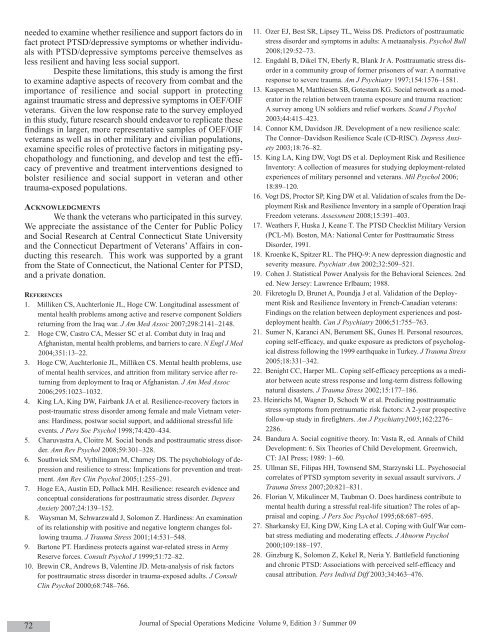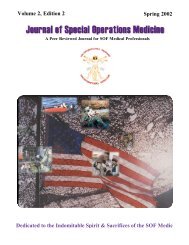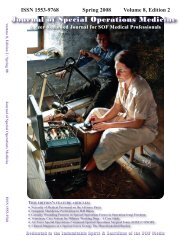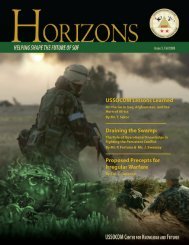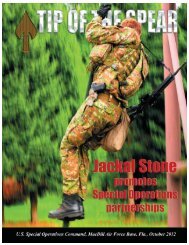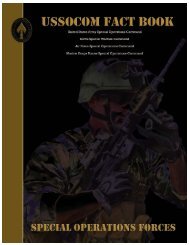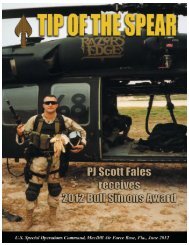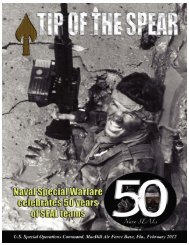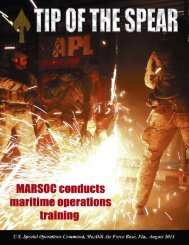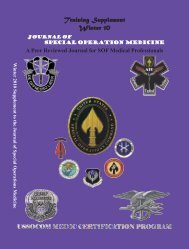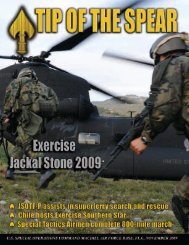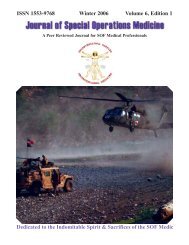Summer - United States Special Operations Command
Summer - United States Special Operations Command
Summer - United States Special Operations Command
Create successful ePaper yourself
Turn your PDF publications into a flip-book with our unique Google optimized e-Paper software.
needed to examine whether resilience and support factors do infact protect PTSD/depressive symptoms or whether individualswith PTSD/depressive symptoms perceive themselves asless resilient and having less social support.Despite these limitations, this study is among the firstto examine adaptive aspects of recovery from combat and theimportance of resilience and social support in protectingagainst traumatic stress and depressive symptoms in OEF/OIFveterans. Given the low response rate to the survey employedin this study, future research should endeavor to replicate thesefindings in larger, more representative samples of OEF/OIFveterans as well as in other military and civilian populations,examine specific roles of protective factors in mitigating psychopathologyand functioning, and develop and test the efficacyof preventive and treatment interventions designed tobolster resilience and social support in veteran and othertrauma-exposed populations.ACKNOWLEDGMENTSWe thank the veterans who participated in this survey.We appreciate the assistance of the Center for Public Policyand Social Research at Central Connecticut State Universityand the Connecticut Department of Veterans’ Affairs in conductingthis research. This work was supported by a grantfrom the State of Connecticut, the National Center for PTSD,and a private donation.REFERENCES1. Milliken CS, Auchterlonie JL, Hoge CW. Longitudinal assessment ofmental health problems among active and reserve component Soldiersreturning from the Iraq war. J Am Med Assoc 2007;298:2141–2148.2. Hoge CW, Castro CA, Messer SC et al. Combat duty in Iraq andAfghanistan, mental health problems, and barriers to care. N Engl J Med2004;351:13–22.3. Hoge CW, Auchterlonie JL, Milliken CS. Mental health problems, useof mental health services, and attrition from military service after returningfrom deployment to Iraq or Afghanistan. J Am Med Assoc2006;295:1023–1032.4. King LA, King DW, Fairbank JA et al. Resilience-recovery factors inpost-traumatic stress disorder among female and male Vietnam veterans:Hardiness, postwar social support, and additional stressful lifeevents. J Pers Soc Psychol 1998;74:420–434.5. Charuvastra A, Cloitre M. Social bonds and posttraumatic stress disorder.Ann Rev Psychol 2008;59:301–328.6. Southwick SM, Vythilingam M, Charney DS. The psychobiology of depressionand resilience to stress: Implications for prevention and treatment.Ann Rev Clin Psychol 2005;1:255–291.7. Hoge EA, Austin ED, Pollack MH. Resilience: research evidence andconceptual considerations for posttraumatic stress disorder. DepressAnxiety 2007;24:139–152.8. Waysman M, Schwarzwald J, Solomon Z. Hardiness: An examinationof its relationship with positive and negative longterm changes followingtrauma. J Trauma Stress 2001;14:531–548.9. Bartone PT. Hardiness protects against war-related stress in ArmyReserve forces. Consult Psychol J 1999;51:72–82.10. Brewin CR, Andrews B, Valentine JD. Meta-analysis of risk factorsfor posttraumatic stress disorder in trauma-exposed adults. J ConsultClin Psychol 2000;68:748–766.11. Ozer EJ, Best SR, Lipsey TL, Weiss DS. Predictors of posttraumaticstress disorder and symptoms in adults: A metaanalysis. Psychol Bull2008;129:52–73.12. Engdahl B, Dikel TN, Eberly R, Blank Jr A. Posttraumatic stress disorderin a community group of former prisoners of war: A normativeresponse to severe trauma. Am J Psychiatry 1997;154:1576–1581.13. Kaspersen M, Matthiesen SB, Gotestam KG. Social network as a moderatorin the relation between trauma exposure and trauma reaction:A survey among UN soldiers and relief workers. Scand J Psychol2003;44:415–423.14. Connor KM, Davidson JR. Development of a new resilience scale:The Connor–Davidson Resilience Scale (CD-RISC). Depress Anxiety2003;18:76–82.15. King LA, King DW, Vogt DS et al. Deployment Risk and ResilienceInventory: A collection of measures for studying deployment-relatedexperiences of military personnel and veterans. Mil Psychol 2006;18:89–120.16. Vogt DS, Proctor SP, King DW et al. Validation of scales from the DeploymentRisk and Resilience Inventory in a sample of Operation IraqiFreedom veterans. Assessment 2008;15:391–403.17. Weathers F, Huska J, Keane T. The PTSD Checklist Military Version(PCL-M). Boston, MA: National Center for Posttraumatic StressDisorder, 1991.18. Kroenke K, Spitzer RL. The PHQ-9: A new depression diagnostic andseverity measure. Psychiatr Ann 2002;32:509–521.19. Cohen J. Statistical Power Analysis for the Behavioral Sciences. 2nded. New Jersey: Lawrence Erlbaum; 1988.20. Fikretoglu D, Brunet A, Poundja J et al. Validation of the DeploymentRisk and Resilience Inventory in French-Canadian veterans:Findings on the relation between deployment experiences and postdeploymenthealth. Can J Psychiatry 2006;51:755–763.21. Sumer N, Karanci AN, Berument SK, Gunes H. Personal resources,coping self-efficacy, and quake exposure as predictors of psychologicaldistress following the 1999 earthquake in Turkey. J Trauma Stress2005;18:331–342.22. Benight CC, Harper ML. Coping self-efficacy perceptions as a mediatorbetween acute stress response and long-term distress followingnatural disasters. J Trauma Stress 2002;15:177–186.23. Heinrichs M, Wagner D, Schoch W et al. Predicting posttraumaticstress symptoms from pretraumatic risk factors: A 2-year prospectivefollow-up study in firefighters. Am J Psychiatry2005;162:2276–2286.24. Bandura A. Social cognitive theory. In: Vasta R, ed. Annals of ChildDevelopment: 6. Six Theories of Child Development. Greenwich,CT: JAI Press; 1989: 1–60.25. Ullman SE, Filipas HH, Townsend SM, Starzynski LL. Psychosocialcorrelates of PTSD symptom severity in sexual assault survivors. JTrauma Stress 2007;20:821–831.26. Florian V, Mikulincer M, Taubman O. Does hardiness contribute tomental health during a stressful real-life situation? The roles of appraisaland coping. J Pers Soc Psychol 1995;68:687–695.27. Sharkansky EJ, King DW, King LA et al. Coping with Gulf War combatstress mediating and moderating effects. J Abnorm Psychol2000;109:188–197.28. Ginzburg K, Solomon Z, Kekel R, Neria Y. Battlefield functioningand chronic PTSD: Associations with perceived self-efficacy andcausal attribution. Pers Individ Diff 2003;34:463–476.72Journal of <strong>Special</strong> <strong>Operations</strong> Medicine Volume 9, Edition 3 / <strong>Summer</strong> 09


